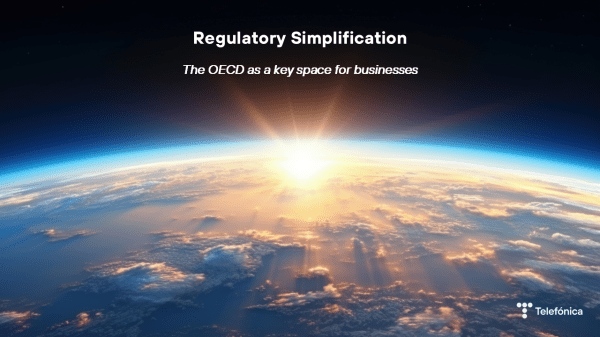This OECD Regulatory and Policy Outlook 2025 report confirms a simple but powerful idea: smarter regulation is a shared responsibility. Governments must lead, but business, civil society and citizens must be part of the process. At a time when public trust is fragile, and the stakes are high, from climate change to digital transformation, better rulemaking is key to effectively addressing the challenges.
In a world marked by disruption, Governments face growing pressure to act effectively. Yet in many cases, existing regulatory frameworks are either too burdensome or insufficiently enforced. A smarter, simpler, and more transparent regulatory environment is needed, not only to manage risks, but to rebuild trust.
From the perspective of companies that operate in highly regulated and rapidly evolving sectors, such as digital connectivity and infrastructure, the message is timely and consequential. Better regulation is not only about simplification. It is about designing rules that protect citizens and the environment while enabling innovation, investment and progress.
Effective regulating for people, the planet, and the future
A well-functioning regulatory environment begins with inclusion. Rules are most effective when they are built with society, including businesses. The OECD notes positive steps in public consultation, particularly through digital platforms. But the process remains incomplete. Only a third of governments provide feedback to stakeholders after consultations. This weakens trust and limits the value of engagement.
For companies, consultation is essential. Early dialogue enables better design, avoids unintended consequences, and supports faster, more effective compliance. It lays the foundation for regulation that works in practice, not just on paper.
This principle of co-creation is especially relevant when facing long-term societal challenges such as the digital and green transition. As the OECD underlines, regulatory frameworks must not only be aligned with strategic goals, they must actively support them. For instance, yet only a minority of OECD countries apply an environmental lens across the full regulatory spectrum.
This matters in sectors central to the transition: energy, transport, digital communications. These are industries where complexity is high, investment cycles are long, and transformation is already underway. At the same time, fragmented and inconsistent rules remain a barrier. The path forward lies in coherent, risk-based approaches and reinforce outcomes.
Meeting long-term goals depends on regulatory certainty. For companies, this means frameworks that are predictable, proportionate, and focused on results. Only then can we scale innovation and align investment with priorities.
Looking ahead, the regulatory task becomes even more complex. Technological change is relentless. Artificial Intelligence, advanced connectivity, and data infrastructure are reshaping every sector. But legal and institutional frameworks are struggling to keep pace. Regulation needs to be flexible, adaptive, without losing rigour. This is particularly true in cross-border sectors where innovation moves quickly, and the costs of outdated regulation is high.
Finally, good regulation is more than design. It is also delivery. Risk-based enforcement, still underutilized across OECD countries, is a key lever. Regulatory bodies must be equipped with the autonomy, skills, and resources to act effectively. Evidence should guide both implementation and oversight.
Towards a better regulatory governance
The OECD Regulatory and Policy Outlook 2025 recommends governments to enhance the effectiveness of their regulatory governance. Drawing on the experiences of OECD countries, the report sets a call to action: regulation must be grounded in evidence, shaped through dialogue, and subject to ongoing monitoring and review, if it is to remain legitimate and effective.
The OECD highlights the relevance of the regulatory impact assessment. Rulemaking should begin with clear, measurable objectives and an evaluation of multiple policy options, including the option of not to regulate. Policies must be designed based on sound evidence-based ex-ante analysis, weighing costs, benefits and risks with rigor and proportionality.
The report also highlights the central role of stakeholder engagement in building trust and ensuring regulatory quality. Meaningful participation from businesses, civil society and citizens strengthens legitimacy, outcomes and fairness. The OECD calls for early consultations, diversified channels of input, and transparent mechanisms to show how feedback shapes the final result.
Yet despite progress in many areas, the report is blunt in its diagnosis of a persistent weakness: the lack of ex-post evaluation. Few countries systematically monitor whether regulations are delivering on their intended goals, and even fewer assess long-term effects. The OECD stresses that monitoring must be embedded from the outset, with reliable indicators and feedback loops across the full regulatory cycle.
Finally, the report turns to institutions in charge of rulemaking. Regulatory effectiveness, it argues, depends also on the capability to apply rules consistently, aligned with strategic priorities, and adapt them when needed. This requires investment in analytical capacity, strategic foresight and professional development within the public sector.
This report is a key reference for good regulatory practices, stressing the importance of ex-ante analysis and ex-post evaluation throughout the entire regulatory cycle: from rule design and implementation to review. It calls for evidence-based rule making and stronger ex-post evaluation and underscores the broad consensus on the need for regulatory simplification.
The OECD’s 2025 Policy and Regulatory Outlook points to a shared challenge, and a shared responsibility. Smarter regulation is not only a condition for progress; it is a driver of trust. We welcome this vision and remain committed to contributing constructively to its realization.







